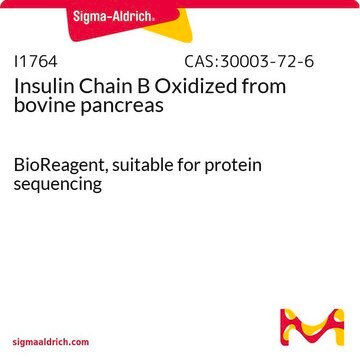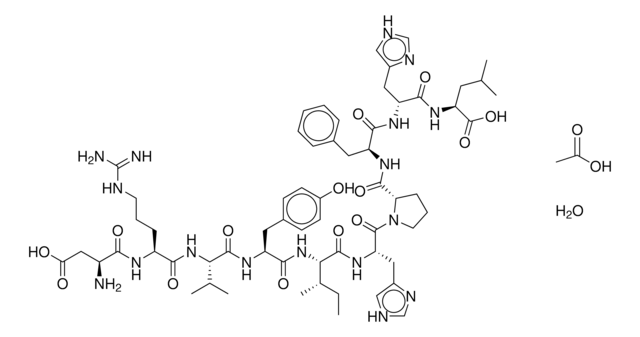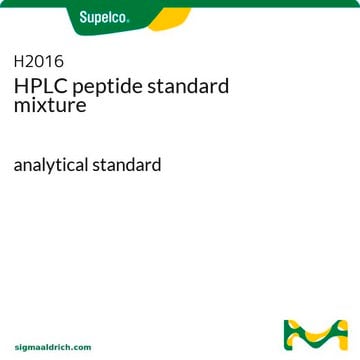B1401
Bradykinin Fragment 1-5
≥97% (HPLC)
About This Item
Empfohlene Produkte
Assay
≥97% (HPLC)
Form
powder
UniProt-Hinterlegungsnummer
Lagertemp.
−20°C
SMILES String
NC(CCCNC(N)=N)C(=O)N1CCCC1C(=O)N2CCCC2C(=O)NCC(=O)NC(Cc3ccccc3)C(O)=O
InChI
1S/C27H40N8O6/c28-18(9-4-12-31-27(29)30)24(38)35-14-6-11-21(35)25(39)34-13-5-10-20(34)23(37)32-16-22(36)33-19(26(40)41)15-17-7-2-1-3-8-17/h1-3,7-8,18-21H,4-6,9-16,28H2,(H,32,37)(H,33,36)(H,40,41)(H4,29,30,31)
InChIKey
USSUMSBPLJWFSZ-UHFFFAOYSA-N
Angaben zum Gen
human ... KNG1 (includes EG:3827)
Amino Acid Sequence
Biochem./physiol. Wirkung
Verpackung
Lagerklassenschlüssel
11 - Combustible Solids
WGK
WGK 3
Flammpunkt (°F)
Not applicable
Flammpunkt (°C)
Not applicable
Persönliche Schutzausrüstung
Eyeshields, Gloves, type N95 (US)
Analysenzertifikate (COA)
Suchen Sie nach Analysenzertifikate (COA), indem Sie die Lot-/Chargennummer des Produkts eingeben. Lot- und Chargennummern sind auf dem Produktetikett hinter den Wörtern ‘Lot’ oder ‘Batch’ (Lot oder Charge) zu finden.
Besitzen Sie dieses Produkt bereits?
In der Dokumentenbibliothek finden Sie die Dokumentation zu den Produkten, die Sie kürzlich erworben haben.
Kunden haben sich ebenfalls angesehen
Unser Team von Wissenschaftlern verfügt über Erfahrung in allen Forschungsbereichen einschließlich Life Science, Materialwissenschaften, chemischer Synthese, Chromatographie, Analytik und vielen mehr..
Setzen Sie sich mit dem technischen Dienst in Verbindung.









